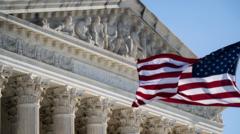In a landmark case, former President Donald Trump has made an emergency appeal to the Supreme Court concerning his decision to fire Hampton Dellinger, the head of the U.S. Office of Special Counsel. Dellinger, who was appointed by Biden, argues his termination, conveyed through a brief email, violates existing laws that protect leaders of independent agencies from being dismissed “except for neglect of duty, malfeasance, or inefficiency.”
The case comes amid Trump's ongoing efforts to reshape the federal bureaucracy, which has included the dismissal of numerous inspectors general and the layoffs of thousands of federal employees. Following Dellinger’s firing, he initiated legal action against the Trump administration, leading to a temporary order from a federal judge allowing him to maintain his position while the case proceeds.
The Trump administration subsequently appealed to the U.S. Court of Appeals, which refused to reverse the lower court's ruling. The Department of Justice is urging the Supreme Court to intervene, framing the appeal as a critical test of presidential power over federal agencies. Acting Solicitor General Sarah M. Harris argued in her filing that the lower court's actions undermine executive authority, suggesting that no American court had previously enforced such an injunction concerning an agency head’s employment.
In addition to this legal confrontation, Trump’s presidency has been characterized by a larger campaign to downsize and streamline the federal workforce, affecting an estimated 9,500 employees across various departments. Moreover, around 75,000 workers have opted for buyout packages under the government efficiency initiative led by a task force associated with business magnate Elon Musk.
This emerging legal landscape not only delineates the boundaries of presidential authority but also highlights the ongoing tensions surrounding governmental oversight and accountability. It remains to be seen how the Supreme Court will navigate this complex intersection of executive power and agency independence.
The case comes amid Trump's ongoing efforts to reshape the federal bureaucracy, which has included the dismissal of numerous inspectors general and the layoffs of thousands of federal employees. Following Dellinger’s firing, he initiated legal action against the Trump administration, leading to a temporary order from a federal judge allowing him to maintain his position while the case proceeds.
The Trump administration subsequently appealed to the U.S. Court of Appeals, which refused to reverse the lower court's ruling. The Department of Justice is urging the Supreme Court to intervene, framing the appeal as a critical test of presidential power over federal agencies. Acting Solicitor General Sarah M. Harris argued in her filing that the lower court's actions undermine executive authority, suggesting that no American court had previously enforced such an injunction concerning an agency head’s employment.
In addition to this legal confrontation, Trump’s presidency has been characterized by a larger campaign to downsize and streamline the federal workforce, affecting an estimated 9,500 employees across various departments. Moreover, around 75,000 workers have opted for buyout packages under the government efficiency initiative led by a task force associated with business magnate Elon Musk.
This emerging legal landscape not only delineates the boundaries of presidential authority but also highlights the ongoing tensions surrounding governmental oversight and accountability. It remains to be seen how the Supreme Court will navigate this complex intersection of executive power and agency independence.




















